- Home
- Bronwyn Scott
Innocent in the Prince's Bed Page 7
Innocent in the Prince's Bed Read online
Page 7
Illarion nodded, his gaze thoughtfully on the canvas. ‘There is irony in attempting to capture transience. Your Constable seeks to trap change into some sort of permanence on canvas, I think.’
‘Don’t poets do the same thing?’ She tossed him a smile full of friendly challenge. ‘Except they capture a moment with words instead of oils.’
His blue gaze contemplated her, making her feel as if he were capturing her. They might have been alone in the crowded room in that moment. ‘Touché, Lady Dove. We do indeed. How insightful.’
‘You’re having a good time.’ It was a statement, not a question, but it wasn’t without a certain element of surprise on her part. He was enjoying this, Dove realised. He was enjoying her. And she was enjoying him.
‘I am, aren’t you? You seemed somewhat amazed that this should be the case.’ He grinned and they began to stroll once more past minor works that didn’t require their concentration or commentary.
‘Except for my father, I don’t know many gentlemen who enjoy art so thoroughly.’ Dove could not imagine discussing Constable with any of her court. Lord Fredericks would stare at her and say ‘quite so, quite so’ and she certainly couldn’t imagine strolling here with Percivale, who would only come to be seen. She cautioned herself to be fair. He wasn’t the only one who simply came to be seen. Most people came for strictly that reason. But not her. Not Illarion. They’d actually come to enjoy the art. She slanted a quiet look in Illarion’s direction, taking him in with a new view. They had something in common now.
‘You know something of the artists’ world, Lady Dove. You mentioned yesterday that you draw. Do you paint as well?’ he ventured, impressing her further.
‘I draw, mainly. Pencils and charcoal. I paint a little. Nothing like this.’ She was suddenly reticent, shy about her talent.
‘I would like to see your work some time,’ he offered, perhaps to be polite. Then his eyes sparked. ‘I know, we should have an artists’ picnic. You can bring your sketching and I can bring my notebook. We could lie beneath the sky and indulge our creativity.’ Dove smiled at the image his words created. It sounded lovely and impossible. Such a suggestion was far too private. She said nothing, wanting to savour the idea of such an outing instead of ruining it with practicalities like chaperons. Her mother was here somewhere, trailing behind them. It seemed they’d left her at the last picture.
‘Does your whole family enjoy art, then?’ Illarion asked.
‘Yes. My mother used to paint. I don’t think anyone can live in Cornwall and not love art. The countryside is full of artistic potential. There’s a wildness to it, a natural beauty that begs to be captured: cliffs, rivers, the sea. And there are gardens. We can grow the most amazing plants in Cornwall.’ She paused. She was getting too excited about home. ‘I’m sorry, I was rambling.’
‘Not at all.’ Illarion’s eyes crinkled at the corners. ‘I would like to see Cornwall. I think it is a place that inspires and a man, especially a poet, is always looking for sources of inspiration.’
‘I think art is an important piece of expression,’ Dove offered, ‘even if one does it badly. It means something to the artist.’ She paused, thinking of the children she’d left behind in Cornwall. The gallery, seeing all the paintings, had made her nostalgic. ‘I have a small art school at home where I teach the children in the village.’ It was not something she’d talked about since coming to London, but it seemed right to share it in this moment.
Illarion’s face filled with a smile. ‘That sounds wonderful, a place where children can learn to express themselves at an early age. Not only expression, but inspiration. You’re helping them to see the inspiration around them in their daily lives, helping them to appreciate nature through that expression. Perhaps you are teaching the next Constable.’
She blushed at that. ‘It isn’t much. I only pass on what I know, what I’ve learned from my tutors.’ But she was touched that he understood the goals behind her pet project. Her school was so much more than just the physical act of painting or drawing.
He didn’t let her argue against his praise. ‘It’s more than they’d have otherwise. Never underestimate the power of a gift, no matter how small.’
They’d reached the end of the gallery; he guided her outside to one of the verandas overlooking the river and gestured towards a table set with white linen, a vase of white roses in full bloom and chairs for three, a reminder that they were not entirely alone. Her mother would be joining them. ‘I took the liberty of arranging for refreshment.’ He held out her chair and gave her a melting smile. Today, he was redefining the term ‘Prince Charming’.
She gave a nod towards the white roses with a teasing goad. ‘No lilies today?’ She liked this Prince Charming, but she missed the sharp-edged man who pricked her temper and her conscience.
‘White roses suit you. You, too, have layers, I am discovering.’ He evaded a direct answer, plucking a rose from the vase and presented it to her with a flourish that was half-mocking gallantry and half-seriousness. ‘A token of transient beauty, like Constable’s weather.’ Their eyes held, something subtle passed between them before he looked beyond her shoulder and straightened. She knew without turning that he’d spotted her mother coming towards them. In that instant, Dove resented her mother’s arrival. It would break the spell. There would be no more private riddles about lilies and roses, no more discussion of her art school. He held her gaze for a last, lingering moment as if he, too, felt the loss. ‘To transience, my dear,’ he murmured, rising from his chair to help her mother and direct the arrival of the tiered tray of cakes and sandwiches and the tea. ‘Lady Redruth, come and sit. We have the most splendid view of the Thames and the best of weather in which to enjoy it.’
Dove heard the teasing laughter beneath his words and knew the mention of weather was for her. Even surrounded by others, he’d managed a type of privacy for them alone. What a skill that was and how intoxicating even if she knew it shouldn’t be. She really must try harder to resist his charm. Nothing could come of this interlude except memories, which of course assumed the opposite—that she wanted something to come of it. What would that something be? She had the afternoon to ponder it, to watch him in action as he continued to dazzle effortlessly.
Chapter Eight
Oh, he was smooth! She couldn’t help but admire the way he talked with her mother, the way he greeted everyone who passed by their table. He seemed to know everyone and their table became a social hub. Before she realised it, they were holding court, or rather the Prince was. People wanted to be with him, he was a magnet. And no wonder. Dove noted how he knew something personal about each passer-by. He’d ask after a favourite horse, or a beloved relative. No one was beneath his notice or attention; not the ageing aunts who’d been pressed into chaperon duty to earn their keep, not the spinsters whom society had overlooked, not the enterprising mothers who had dragged their daughters over to meet her and her mother, but in reality had come to the table to see him. He was generous with them all.
Extra chairs were brought over, the tiered tea tray was refilled twice and still the people came. Gentlemen with ladies on their arms strolled by to exchange a brief word, the women eyeing her with calculated speculation. Dove could see the question in their eyes: what was she doing with the Season’s most coveted bachelor? There was speculation in the gentlemen’s eyes as well. What was the Prince doing with the Season’s most anticipated debutante? She could almost hear their thoughts: hadn’t she been intended for someone more traditional? Someone more English? Had everyone known, then? Was she the only one who hadn’t truly understood what her debut had meant? Society had already decided her future when she had not even grasped it.
There was a certain tension beneath the gentlemen’s bonhomie. Dove slid her glance towards Illarion as recognition flared. The men were wary of him. He didn’t belong, not quite, despite the fact that he was like them in many ways. He had
wealth, he had a title, dubious as it might be. Still, he wasn’t one of them. He was an outsider, not entirely accepted because he was different. Did Illarion understand that? It put his clothing at her ball into a new light. Had his choice of evening attire been a small rebellion on his part? A chance to thumb his nose at society with its rules?
If such things bothered Illarion, he didn’t show it. But the realisation gave her yet another lens through which to view him, this time as a man far from home. A man alone in a new world. Not unlike herself. Each day she was here, Cornwall seemed further away, taking her true self with it. Did he feel that way about Kuban? She had not believed him yesterday when he’d said he knew something of homesickness. Today, she thought she might have erred. She might have erred in other ways, too. His attraction was not just the physical impact of his looks—although some women would never look further—it was in how he made people feel. Despite their wariness, people couldn’t help but like him, at least for the moment. It was hard to dislike someone who showed an interest in you. It had worked with her, after all, hadn’t it?
The flow of guests past their table fell off, giving Dove a moment of quiet. Her fingers itched to pick up a pencil and draw him, to see beyond the planes and lines of the straight nose, the strong jaw, beyond the leonine lengths of his champagne-coloured hair. If she could draw him, she could know him.
A shadow fell across their table, the brief respite interrupted by Percivale himself. ‘Ah, I thought I’d find you here at the centre of attention,’ he effused, offering a short bow that encompassed all of them, although it was not clear if his words were meant as a compliment to her or a reprimand to Illarion. Of all the men who had come by the table, Percivale’s wariness towards Illarion was the most palpable. ‘You seem to be at the centre of everything these days, Kutejnikov.’ Ah, so he had meant to snub Illarion with his remark. It was a further snub to forgo any reference to Illarion’s title. ‘You must be enjoying your first Season in London.’ Another reference to Illarion’s status as an outsider to the elite circles of the ton where everyone had known everyone for generations. His gaze drifted over the crumbly remains of the oft-filled tea tray.
‘I apologise for not having anything to offer you.’ Illarion’s tone was generous, overlooking the insult. ‘But as you can see, you’ve caught us at the end of our refreshment.’ Translation: you are late to the party, old chap. The tray had been replenished several times already, but Illarion made no move to refill it now. Something competitive and primal sprang up between the two men.
‘No bother.’ Percivale dismissed the tray as unimportant. ‘I only stopped by to pay my respects.’ His gaze moved to her, his blue eyes lacking the lively flame of Illarion’s. They were empty, simply blue and nothing more. ‘I hope you enjoyed the exhibit, Lady Dove?’
She opened her mouth to reply, but he went on without stopping. ‘You didn’t find looking at all the art too tedious? There are so many pictures on the walls they all start to look alike.’ There was another strike against him. She’d been unable to imagine sharing the exhibit with Percivale and she’d been right. While Illarion had planned an outing that would please her, Percivale didn’t even know she enjoyed art. She could spend hours looking at the paintings, studying each line, each colour choice, each brush stroke, but he dismissed each individual work collectively within seconds. If he was a smart man, he would stop here. But Percivale wasn’t done with his self-immolation.
‘Such a to-do every year over paintings. It’s ridiculous the Royal Academy insists on creating a profession out of being an artist. A hobby is one thing, tolerable even. But encouraging it as a career in this day and age? It’s almost irresponsible.’ He was speaking to Illarion now. ‘I’m a scientist myself. Inventions, steam, industrialisation, that’s where true innovation lies.’
It took all her willpower not to argue that art was a form of human expression, a form of innovation that captured the essence of the human experience. But Dove needn’t have worried. Illarion was all too ready to make the argument on her behalf. ‘I think some might disagree with you, Percivale. Lady Dove, herself, is a fine artist. She draws, did you know?’
‘A fine hobby for a woman, something to occupy her time and her mind.’ Percivale nodded, oblivious to the caution, the clue, Illarion had tossed him. Dove, however, was not oblivious. Did Percivale think such remarks made him sound liberated? Illarion was making Percivale look like a fool. No, she amended. Illarion had given him a last lifeline to retract his tactless comment and Percivale had eschewed it.
‘Lady Dove was sharing with me that she runs a school in Cornwall for children where she teaches them painting and drawing.’ Illarion added, ‘So that they might have new channels of expression available to them. I think it’s quite noble of her.’
‘To be sure, Lady Dove is generous to those less fortunate,’ Percivale dismissed with a smile that bordered on condescending. ‘Do you have much industry where you’re from, Kutejnikov?’ The comment was meant as an insult against Kuban and its reported isolation, bordered by the Turks and not much else.
‘No,’ Illarion answered evenly with a misleading smile that implied friendship where there was none. ‘Unlike England, we have eschewed the ugliness of coal mines and factory cities for the natural beauty of nature.’ On that note, Illarion rose and offered an arm to her and to her mother. ‘Lady Dove, Lady Redruth, shall we go? I told my driver to bring the carriage around at four. He’ll be waiting for us. Lord Percivale, if you will excuse us?’ It was all masterfully done. One way to win an argument was to simply leave it. She would have to remember the tactic. It was a small satisfaction to be able to walk away while Lord Percivale was still picking his jaw up from the floor.
* * *
The Prince was making a perfect muddle of the Season! The man had no breeding. He’d dismissed a future duke, for heaven’s sake. What sort of gentleman behaved like that? Percivale was just glad no one had been about to see it. It had been humiliating. Never one to voice an opinion the majority might find unpopular, Percival took consolation in the fact that he wasn’t alone in these thoughts.
By the time he arrived at White’s to fortify himself for another evening out amongst the ton, others had gathered to express the same sentiment. ‘The damned foreigner didn’t know the least about how it’s supposed to work,’ one gentlemen announced with authority.
‘He thinks he’s better than us,’ said another.
‘It’s not just that,’ came a man from the corner, a young baronet newly up from the country, hoping to catch a bride with little more than his looks. ‘He’s taken all the ladies’ attentions. The ladies aren’t interested in us when he’s nearby.’ That remark got a response. The volume in the club rose as men shared their experiences: the women loved his hair, his blue eyes, the way he danced, his accent.
One of Percivale’s close friends, young Viscount Heatherly, nudged him. ‘What are your thoughts, Percivale? He’s been spending time in Lady Dove’s court.’
Percivale shrugged as if he wasn’t bothered. ‘Lady Dove is popular, everyone spends time in her court. Even you.’ He elbowed his friend good naturedly. He was smart enough to avoid giving an outward show of fear.
‘He took her to the Academy today, I hear,’ Heatherly pressed.
‘Yes, I know. I saw them and stopped to chat.’ Never mind he’d been dismissed. Heatherly and these chaps didn’t need to know that. All they needed to know was he was not bothered by the Prince’s attentions towards his intended. Everyone knew Lady Dove was his, destined for him even. Everyone knew grand families married grand families and they were two of the grandest. It would be the height of insecurity if he worried aloud. Besides, he was confident in his own appeal. He was attractive and he’d just become more so. A note had arrived that morning informing him that his ageing uncle was sickly and taking a turn for the worse. The title of Ormond was closer than ever. He’d meant to share the news with Lady D
ove today, until Kutejnikov had ruined his plans.
Lady Dove Sanford-Wallis and her dowry was his. To be sure, he didn’t like discovering that she’d gone driving with the Prince yesterday and out with him again today. It had all been very proper. Her mother had been along. But two days in a row? Percivale knew what the Prince wanted—her money, like every other man in London. Rumour had it the Prince had some wealth of his own, but no land to go with it. He was an exiled upstart. What better way to establish himself than to marry a woman of substance, acquire some land through her and even some social standing, before his popularity ran out or something unsavoury was discovered? Percivale was confident in one thing: the Prince would dig his own grave as so many who didn’t truly belong in society did. It was the circle of tonnish life. Under no circumstance would he panic over the Kubanian upstart.
Percivale looked around the club, listening to the rising conversations of discontent. It was always intriguing to him to watch society work and it was definitely at work now, an organism recognising a foreign subject and labouring to expel it. Did the Prince understand London’s gentlemen had just declared war on Illarion Kutejnikov?
Chapter Nine
Apparently Percivale hadn’t taken his dismissal at the Academy well, Illarion mused from his place on Dove’s left side as her court gathered during intermission at the Hamptons’ musicale. Since the Academy art show, Percivale had been glued to Dove. The young scion spent copious amounts of the evening flashing dagger glares in Illarion’s direction. Not that such looks intimidated Illarion. It wasn’t the first time Illarion had made an enemy over a woman. Neither was it the first time ballrooms had become battlefields where a pretty one was concerned. Illarion knew how to play that game. Too well. It would take more than thunderous stares from an ego-bruised young nobleman to send him scurrying in the other direction.

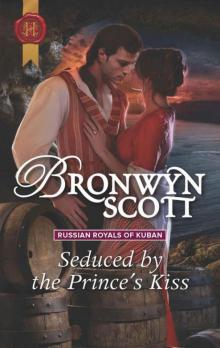 Seduced By The Prince's Kiss (Russian Royals 0f Kuban Book 4)
Seduced By The Prince's Kiss (Russian Royals 0f Kuban Book 4)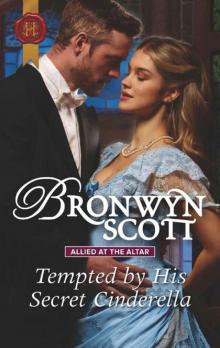 Tempted By His Secret Cinderella (Allied At The Altar Book 3)
Tempted By His Secret Cinderella (Allied At The Altar Book 3)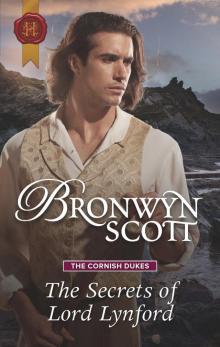 The Secrets of Lord Lynford
The Secrets of Lord Lynford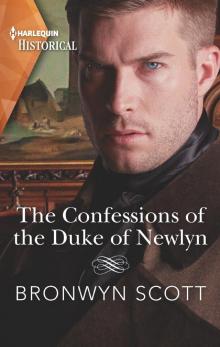 The Confessions of the Duke of Newlyn
The Confessions of the Duke of Newlyn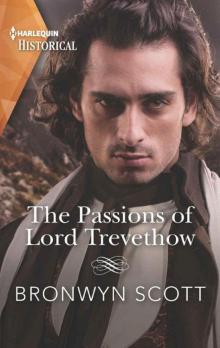 The Passions 0f Lord Trevethow (The Cornish Dukes Book 2)
The Passions 0f Lord Trevethow (The Cornish Dukes Book 2)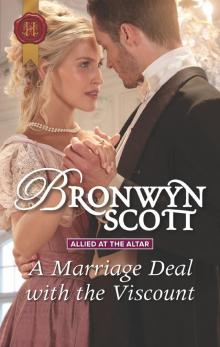 A Marriage Deal with the Viscount--A Victorian Marriage of Convenience Story
A Marriage Deal with the Viscount--A Victorian Marriage of Convenience Story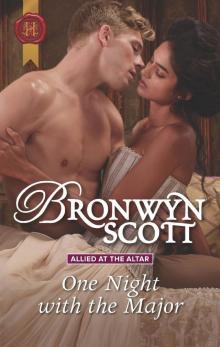 One Night with the Major
One Night with the Major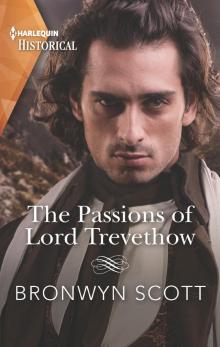 The Passions of Lord Trevethow
The Passions of Lord Trevethow Grayson Prentiss's Seduction
Grayson Prentiss's Seduction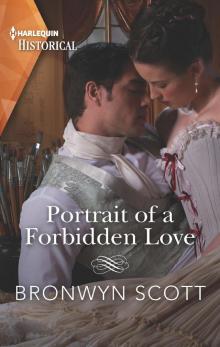 Portrait of a Forbidden Love--A Sexy Regency Romance
Portrait of a Forbidden Love--A Sexy Regency Romance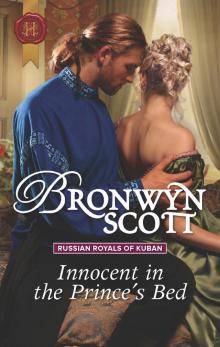 Innocent in the Prince's Bed
Innocent in the Prince's Bed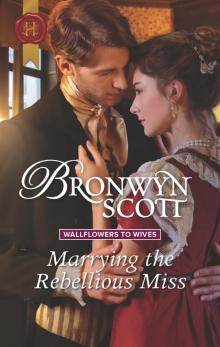 Marrying the Rebellious Miss
Marrying the Rebellious Miss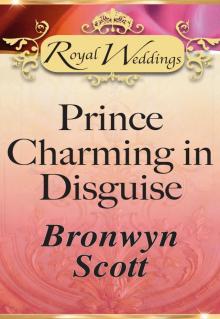 Prince Charming in Disguise
Prince Charming in Disguise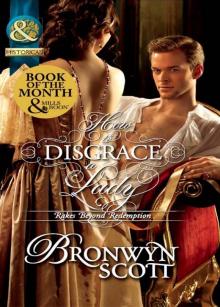 How to Disgrace a Lady
How to Disgrace a Lady Secrets of a Gentleman Escort
Secrets of a Gentleman Escort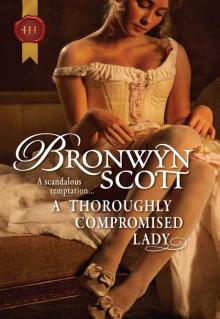 A Thoroughly Compromised Lady
A Thoroughly Compromised Lady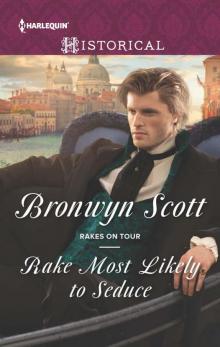 Rake Most Likely to Seduce
Rake Most Likely to Seduce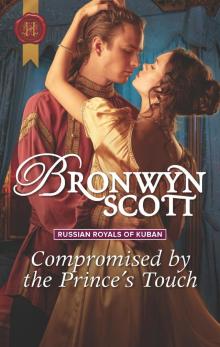 Compromised by the Prince's Touch
Compromised by the Prince's Touch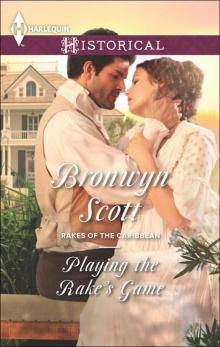 Playing the Rake's Game
Playing the Rake's Game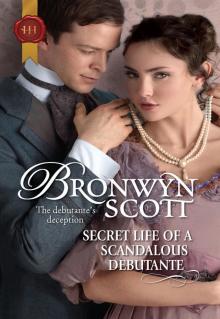 Secret Life of a Scandalous Debutante
Secret Life of a Scandalous Debutante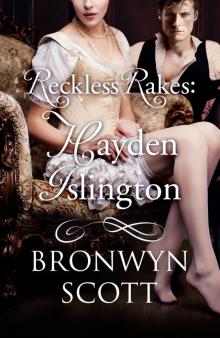 Reckless Rakes - Hayden Islington
Reckless Rakes - Hayden Islington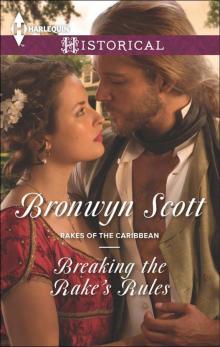 Breaking the Rake's Rules
Breaking the Rake's Rules Arabian Nights with a Rake
Arabian Nights with a Rake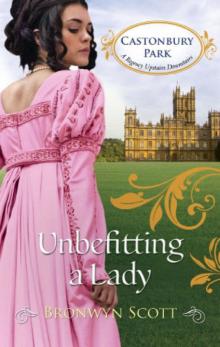 Unbefitting a Lady
Unbefitting a Lady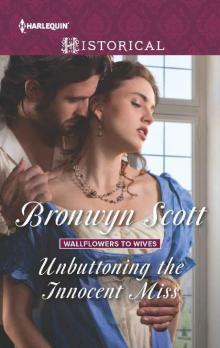 Unbuttoning the Innocent Miss (Wallflowers to Wives)
Unbuttoning the Innocent Miss (Wallflowers to Wives) London's Most Wanted Rake
London's Most Wanted Rake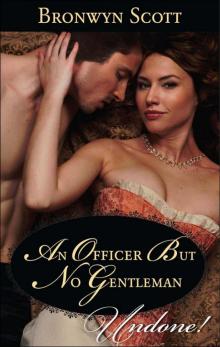 An Officer but No Gentleman
An Officer but No Gentleman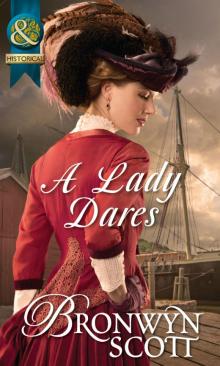 A Lady Dares
A Lady Dares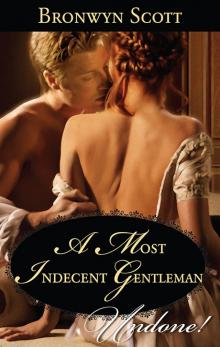 A Most Indecent Gentleman
A Most Indecent Gentleman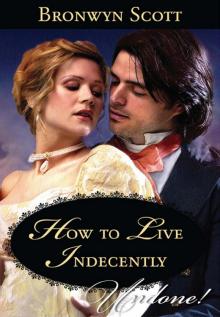 How to Live Indecently
How to Live Indecently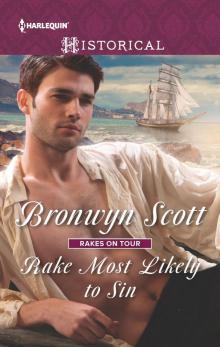 Rake Most Likely to Sin
Rake Most Likely to Sin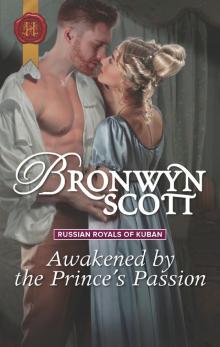 Awakened by the Prince's Passion
Awakened by the Prince's Passion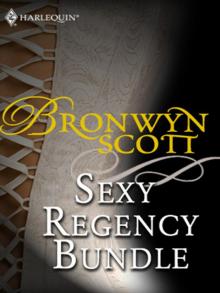 Bronwyn Scott's Sexy Regency Bundle
Bronwyn Scott's Sexy Regency Bundle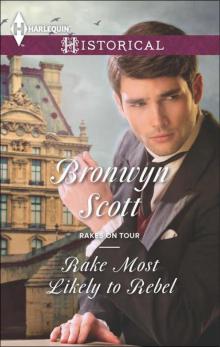 Rake Most Likely to Rebel (Rakes On Tour Book 1)
Rake Most Likely to Rebel (Rakes On Tour Book 1)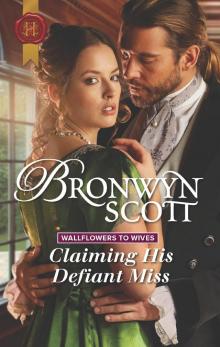 Claiming His Defiant Miss
Claiming His Defiant Miss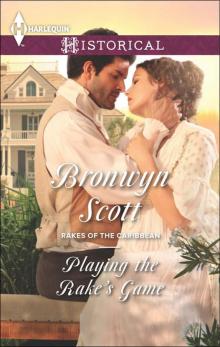 Playing the Rake's Game (Rakes Of The Caribbean Book 1)
Playing the Rake's Game (Rakes Of The Caribbean Book 1)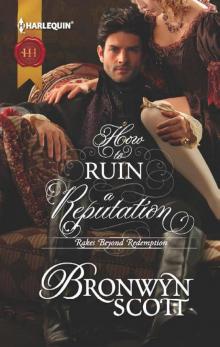 How to Ruin a Reputation (Rakes Beyond Redemption)
How to Ruin a Reputation (Rakes Beyond Redemption)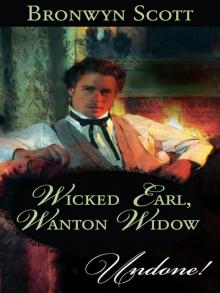 Wicked Earl, Wanton Widow
Wicked Earl, Wanton Widow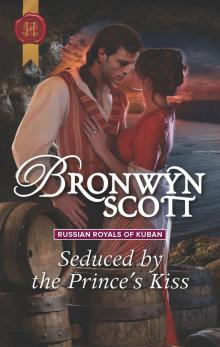 Seduced by the Prince's Kiss
Seduced by the Prince's Kiss